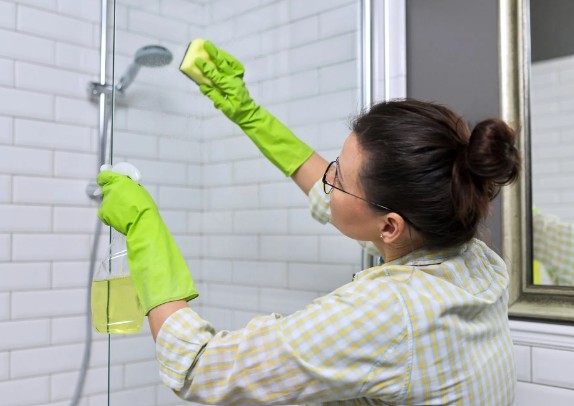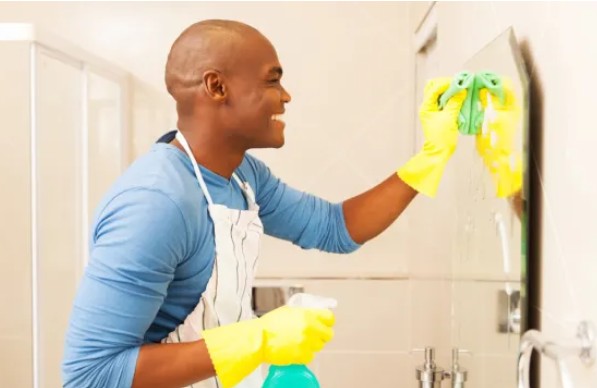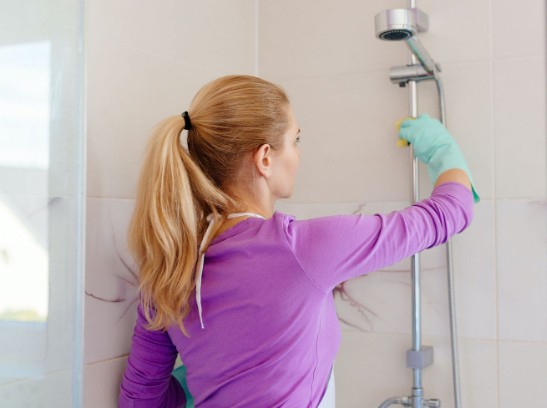So, you’ve run out of your usual shower cleaner, but this sanctuary needs urgent cleaning. What is the solution to this predicament? Can you use toilet bowl cleaner in the shower?
You should not use your toilet bowl cleaner in the shower because these products are designed with strong chemicals to clean and disinfect the toilet’s porcelain and ceramic surfaces. Unfortunately, these chemicals can be too harsh on a shower’s surfaces.
However, that’s not all; toilet bowl cleaners can come in handy when tackling stubborn stains and grime in certain situations. Keep reading to learn more.

Can You Use Toilet Bowl Cleaner In The Shower? (Why You Shouldn’t)
We’ve established that you are better off using a shower cleaner in your shower instead of a toilet bowl cleaner, but why is that? Here is why.
1. Harsh Chemicals
Many toilet bowl cleaners contain strong acids or abrasive agents like bleach, hydrochloric acid, or ammonia, designed for tough toilet stains. Unfortunately, these chemicals can damage the more delicate surfaces of a shower, such as marble, granite, certain tiles, or even the finish of fixtures.
These harsh chemicals can also degrade grout or sealants used in the shower, leading to deterioration or discoloration over time. On top of that, some of these chemicals are not environmentally friendly and, hence, can have a detrimental impact if they go down the drain and into the water supply.
2. Residue and Fumes
Toilet bowl cleaners are formulated to cling to and eliminate stains in the toilet bowl. While this is ideal for toilets, toilet bowl cleaners can leave a residue that is challenging to rinse off thoroughly when used in the shower.
Over time, this residue can pile up, leading to an unsightly buildup on shower surfaces. Aside from residue buildup, toilet bowl cleaners emit strong fumes that could linger in your shower’s enclosed space.
Inhaling these fumes can be unpleasant and potentially harmful. They can cause irritation to the respiratory system or trigger allergic reactions.
3. Skin Irritation
Due to the strong acids, bleaches, or other harsh chemicals in toilet bowl cleaners, you can suffer skin irritation, redness, or even chemical burns if you come into direct contact with these substances.
Also, even if you don’t directly touch the cleaner, the residual chemicals left on shower surfaces can come into contact with your skin during showering. This contact could lead to skin irritation or allergic reactions over time.
4. Damage To Plumbing
Some toilet bowl cleaners contain strong acids or chemicals that can corrode certain materials used in plumbing fixtures. This corrosion can weaken your pipes or seals, leading to leaks or other plumbing issues over time.
Overexposure to harsh chemicals in the cleaners to your plumbing system’s seals and gaskets can cause degradation, leading to leaks or inefficiencies in the plumbing system.
Additionally, your pipes can react adversely to chemicals in toilet bowl cleaners, causing pipe erosion or degradation. How pipes react to toilet bowl cleaners depends on the materials used to make the pipes.
Can I Clean Shower Tiles With Toilet Bowl Cleaner?
Most bathroom tiles, especially ceramic or porcelain ones, can withstand toilet bowl cleaners to some extent. However, although both toilet bowl cleaners and shower tile cleaners serve to remove stains and grime, they’re formulated differently and intended for specific surfaces.
Using toilet bowl cleaner on shower tiles can be risky as it can damage the surface, discolor the tiles, or cause other adverse effects. Therefore, you are better off using cleaners designed explicitly for shower tiles because they will clean them without causing any harm.
For instance, Goo Gone Grout & Tile Cleaner (View on Amazon) works on mold stains, dirt buildup, hard water stains, soap scum, and mildew stains. It is safe for porcelain/ ceramic and grout.
Besides commercial tile cleaners, you can also create DIY cleaners using milder ingredients like vinegar and baking soda, which can effectively clean without damaging your tiles.

What Can I Use To Clean My Shower?
There are various types of cleaners tailored to clean showers effectively. These are:
1) All-Purpose Cleaners
For a convenient, versatile cleaner, choose an all-purpose cleaner for your general shower cleaning, including tiles, glass, and fixtures. They are formulated to remove soap scum, grime, and water stains.
They come in different types and formulations.
- Spray Cleaners: These are common and come in spray bottles for easy application. They usually work on multiple surfaces like tiles, glass, and fixtures. Many are formulated to tackle soap scum, water stains, and general grime.
- Foam Cleaners: Some all-purpose cleaners come in a foam formulation. These adhere better to vertical surfaces, making them great for cleaning shower walls and eliminating soap scum and residues effectively.
- Gel Cleaners: Gel-based all-purpose cleaners are thicker in consistency and adhere well to surfaces, allowing them to stay in place longer, making them practical for removing stains and buildup.
- Concentrated Cleaners: These cleaners come in concentrated form, so dilute them with water before use. They offer flexibility in adjusting the strength based on the cleaning task.
- Eco-Friendly Cleaners: Many all-purpose cleaners are made with eco-friendly ingredients. They often avoid harsh chemicals, relying instead on natural substances that are biodegradable and safer for both users and the environment.
ii) Tile and Grout Cleaners
The grout lines between your shower tiles are susceptible to mold, mildew, and stains. Fortunately, you can keep these porous areas clean with tile and grout cleaners.
There are different types of tile and grout cleaners, such as acidic cleaners, alkaline cleaners, and enzymatic cleaners.
iii) Mildew and Mold Removers
Showers are susceptible to mildew and mold since they are in wet environments. This is where mildew and mold removers come in; they help tackle these persistent issues.
Mold and mildew removers are formulated to target mold and mildew. They may have various active ingredients to prevent and remove mildew and mold.
An excellent example is RMR-86 Instant Mold Stain and Mildew Stain Remover Spray (View on Amazon), which removes stubborn mildew and mold stains and is safe for multiple surfaces.
iv) Bleach or Chlorine-based Cleaners
Consider using bleach or chlorine-based cleaners when tackling tough stains, mold, mildew, and bacteria in your shower.
- Bleach Sprays: Ready-to-use spray formulations containing bleach as the active ingredient are effective for killing mold, mildew, and bacteria on various surfaces in the shower.
- Chlorine Bleach: Standard household bleach is a chlorine-based cleaner. This affordable, easily accessible cleaner effectively disinfects and kills mold and mildew.
- Bleach Gel or Thickened Formulas: These cleaners are more suitable for vertical surfaces as they allow the bleach to stay in place longer, facilitating better contact with the stains.
- Bleach-based Tablets or Pods: These are convenient and pre-measured for easy use, often used for regular maintenance and to prevent mold and mildew buildup in showers.
v) Vinegar-based Cleaners
Vinegar-based cleaners are generally safe and environmentally friendly and do not pose health risks like harsh chemical cleaners. However, they might not be as potent against specific stains or bacteria as more powerful chemical cleaners.
Before using a vinegar-based cleaner on larger surfaces, test it in an inconspicuous area first, especially on delicate surfaces, to ensure it won’t cause damage or discoloration. Additionally, keep in mind that the smell of vinegar might linger for a while, but it dissipates as it dries.
You can buy commercial cleaners that use vinegar as a primary ingredient along with other natural components to enhance cleaning power. They often have pleasant scents added to mask the vinegar smell.
Alternatively, make your own vinegar-based cleaner. You could mix vinegar and baking soda, vinegar and soap, vinegar and citrus, or vinegar and water.

Can I Use Toilet Bowl Cleaner To Clean My Sink?
Do not use a toilet bowl cleaner on your sinks because it is not a general-purpose cleaner. The harsh chemicals in it, like hydrochloric acid or bleach, are suited for the toilet bowl but damage surfaces like porcelain sinks, causing discoloration or scratches.
So buy cleaning products made for sinks or opt for gentle yet effective natural cleaners such as baking soda and vinegar.
Can I Use Toilet Bowl Cleaner To Clean My Bathtub?
Like showers and sinks, cleaning your bathtub with toilet bowl cleaners is not recommended. These cleaners can damage or discolor your tub. Instead, use soapy water, white vinegar and baking soda, or commercial tub cleaners.
Remove stains with hydrogen peroxide. You can also make natural cleaners by diluting products like Castile soap, lemon juice, or essential oils in water.
Other Uses For Toilet Bowl Cleaner
The primary use of toilet bowl cleaners is cleaning toilets. However, you can repurpose these cleaners for other tasks. These include:
a) Cleaning Grout
You can clean grout between tiles with a diluted form of some toilet bowl cleaners. The cleaner’s acidic properties help break down grime and stains.
After diluting your cleaner in a 1:1 ratio, apply it to the grout line using a small brush or an old toothbrush. Ensure it doesn’t spill onto adjacent surfaces, especially if the cleaner can damage them.
Let the cleaner sit for a couple of minutes, gently scrub the grout lines, then thoroughly rinse the area with clean water.
b) Removing Stains
You can repurpose your toilet bowl cleaner to remove certain stains from surfaces other than toilets. Apply a small amount of the cleaner on the surface with stains, let it sit briefly, scrub gently, and rinse well.
c) Clean Trash Cans
You can clean your trash cans with toilet bowl cleaner; the liquid will cling to the can’s inside parts, facilitating better cleaning. The cleaner will disinfect and deodorize your trash cans.
d) Rust Removal
Toilet bowl cleaners can also come in handy in removing rust stains from metal surfaces. However, if you choose to use it, proceed cautiously to avoid damage
e) Outdoor cleaning
If you have an outdoor latrine or toilet, you can clean it with toilet bowl cleaners. You can also disinfect durable outdoor surfaces with diluted toilet bowl cleaners.
However, ensure the cleaner doesn’t get to plants, grass, or other sensitive materials nearby.
Final Remarks on Can You Use Toilet Bowl Cleaner In The Shower?
When selecting cleaning products for your shower and other parts of your home, prioritize safety and longevity. In that case, do not use toilet bowl cleaners in your shower because while these cleaning agents are tough on stains, they are not kind on all surfaces.
Also, Read:
